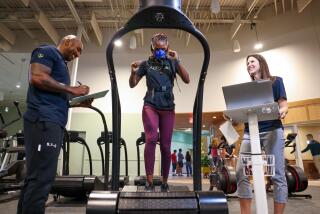Companies take notice as sleep-deprived workers lose productivity
- Share via
Corporate America has long tried to help its employees stop smoking, eat more healthful food and get in better shape.
More recently, companies have been rolling out ways to help them manage their finances. And now more are making it their job to help workers get better sleep.
A growing awareness of the dangers of sleep deprivation on health — and therefore, its effect on insurance costs and worker productivity — is prompting companies to try to improve their employees’ rest.
Goldman Sachs has brought in sleep experts. Johnson and Johnson offers employees a digital health coaching program for battling insomnia that involves an online sleep diary and relaxation videos for mobile devices. Google hosts “sleeposium” events.
Research out of Harvard has shown that, for the average worker, insomnia results in the loss of 11.3 days of productivity each year, or the equivalent of $2,280. As a nation, that represents a total loss of $63.2 billion.
Researchers have also found clear links between poor sleep and reduced quality of life on the job. A study last year showed that people who monitored their smartphones for business reasons after 9 p.m. were more tired and less engaged the next day at work.
Others studies have unearthed a link between insomniac bosses and abusive behavior. And many have examined the correlations between lack of sleep and medical conditions like dementia and diabetes.
As employers’ interest in the sleep habits of their office workers increases, a number of third-party providers are finding ways to capture that market. The corporate wellness provider Ceridian started including sleep coaches last year as part of its package for clients.
And the sleep diagnostic and treatment company SleepMed launched a nationwide health and wellness product for employers last year that screens workers for sleep disorders and gives them access to therapies.
The digital medicine company Big Health officially recently launched a program called Sleepio at Work, which provides employees a “sleep score” based on a questionnaire, creates a personalized sleep program and offers insomnia advice using cognitive behavioral therapy techniques.
It counts LinkedIn and the Michigan-based Henry Ford Health System as clients, and has also helped lead employee workshops on sleep at Google.
James Maas, a former Cornell University psychologist who has delivered sleep speeches at companies for years, says he has more recently begun one-on-one counseling with executives about their sleep as follow-ups to his corporate presentations. “They think sleep is a luxury,” Maas said.
Not only are executives seeking advice themselves, but they’re increasingly the ones driving any organization-wide commitments to the issue.
According to sleep consultant Nancy Rothstein, such benefits or programs used to be led by plant managers and environmental safety heads, whose main concern was with employees working abnormal shifts.
Now more of the programs are “going through human resources and the C-suite,” Rothstein said. “People are being stretched to work unreasonable hours, and it’s just not sustainable. There has to be a paradigm shift.”
The mounting tendency to squeeze more work out of fewer employees is just one factor leading regular employees to get less sleep.
But there are many other well-known culprits: the glowing smartphone and laptop screens that we stare at just before bed; the remote-work arrangements that have increasingly broken down the boundaries between the office and home; the 4 a.m. calls with colleagues overseas.
“At this point, separating our internal biological clocks from the external world has no boundary. We all work 24/7 with ubiquitous connectivity,” said Russell Sanna, a former executive director of the Division of Sleep Medicine at Harvard Medical School who is writing a book on sleep and the workplace.
The numbers are less clear on how many companies have programs or benefits in place to help workers sleep, particularly among the traditional 9-to-5 population.
SIGN UP for the free California Inc. business newsletter >>
Peter Hames, who founded Big Health with Colin Espie, a professor at the University of Oxford who studies sleep disorders, says they’re working with roughly a dozen companies.
That includes an unnamed Fortune 500 manufacturing company that, according to Big Health’s Sleepio website, saw employees get about four more hours of sleep per week and report fewer serious troubles with their sleep after using the program.
But even Hames recognizes that a sleep coach or cognitive behavioral therapy tips will go only so far to change employees’ sleep patterns if companies don’t make broader cultural changes.
“In our Anglo-Saxon work ethic, there’s this concept that sleeping is cheating,” Hames said. That’s why persuading companies to do more may be difficult.
Others could be hesitant to jump into offering more sleep benefits because of the contradiction that employees may perceive. It’s hard for companies to look like a credible advocate for sleeping better, after all, when their accounting departments insist that people take the red-eye flight to save on travel costs.
Like other wellness programs such as stress-management seminars, free sleep counseling has the potential to feel like a Band-Aid slapped on a bigger problem: a corporate environment that promotes 24/7 connectivity and a work-now-sleep-later mentality.
For real change to happen, says Jennifer Piliero, a senior product manager at Ceridian, “it really has to become part of the culture.”
Jena McGregor writes a daily column analyzing leadership in the news for the Washington Post’s On Leadership section.
ALSO:
Google, coming to grips with its giant size, forms a parent company: Alphabet
For high-risk start-ups like Uber, big ambitions don’t make losses any less unsettling
Out-of-state residents love California for summer vacations, study says
More to Read
Inside the business of entertainment
The Wide Shot brings you news, analysis and insights on everything from streaming wars to production — and what it all means for the future.
You may occasionally receive promotional content from the Los Angeles Times.










